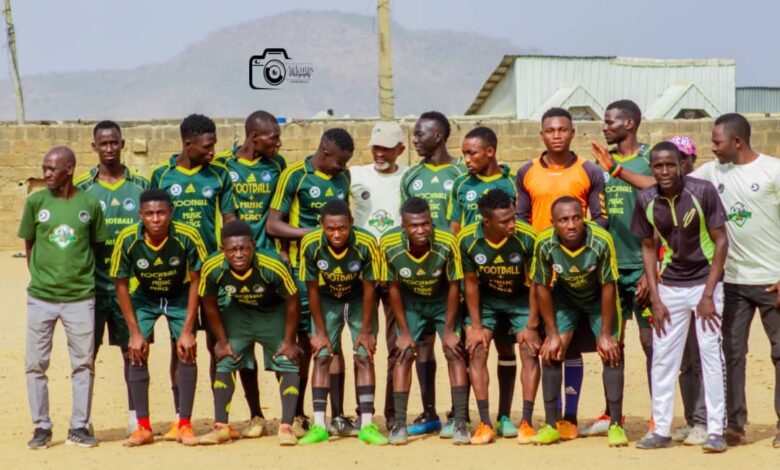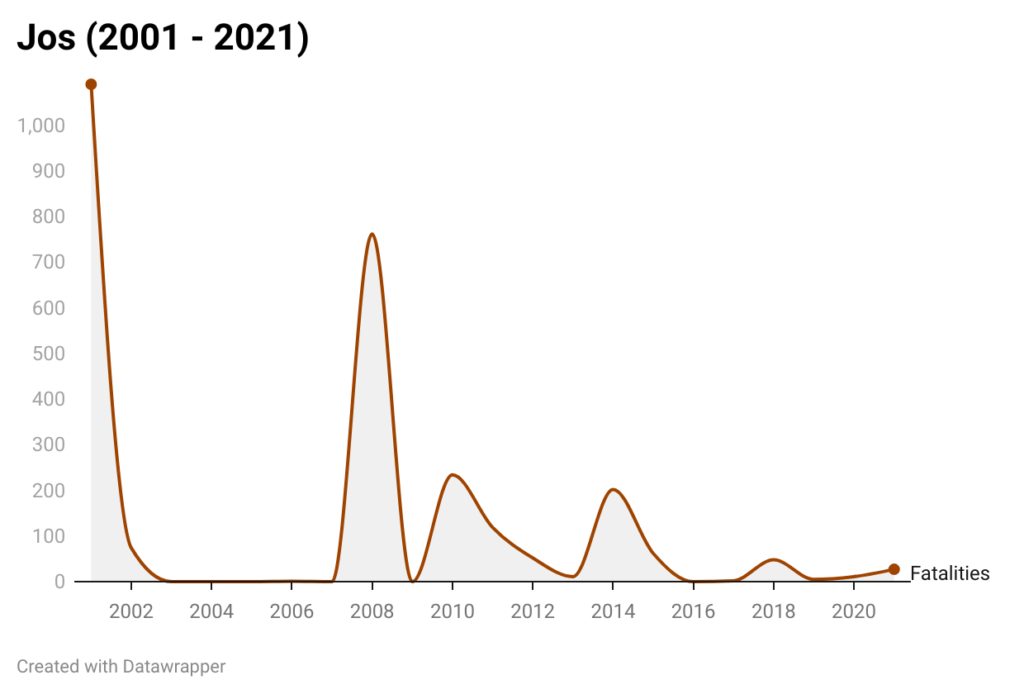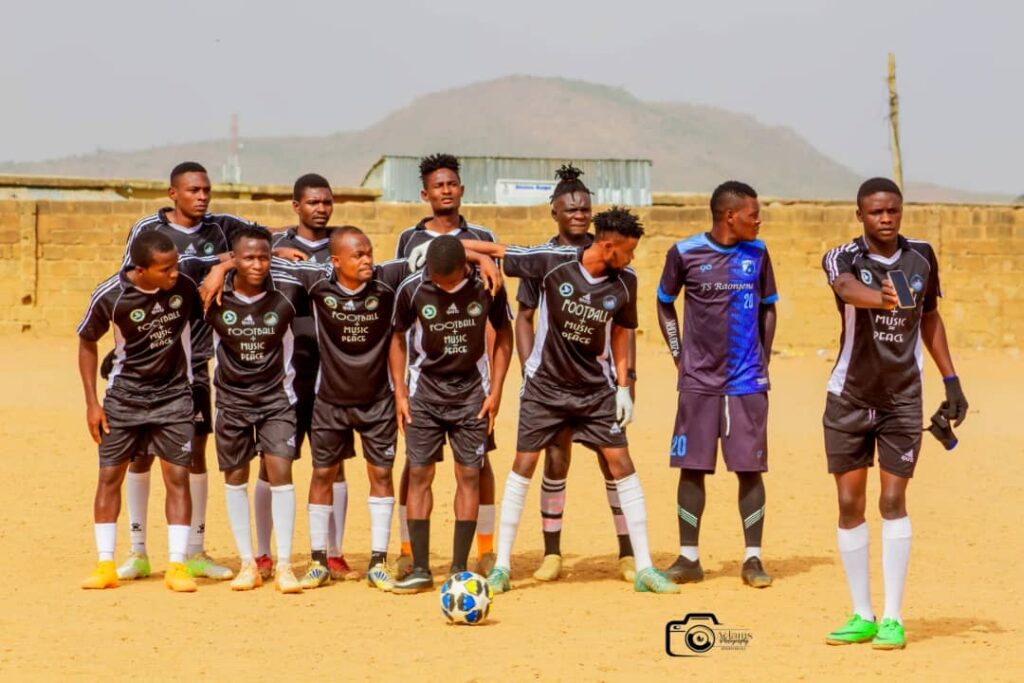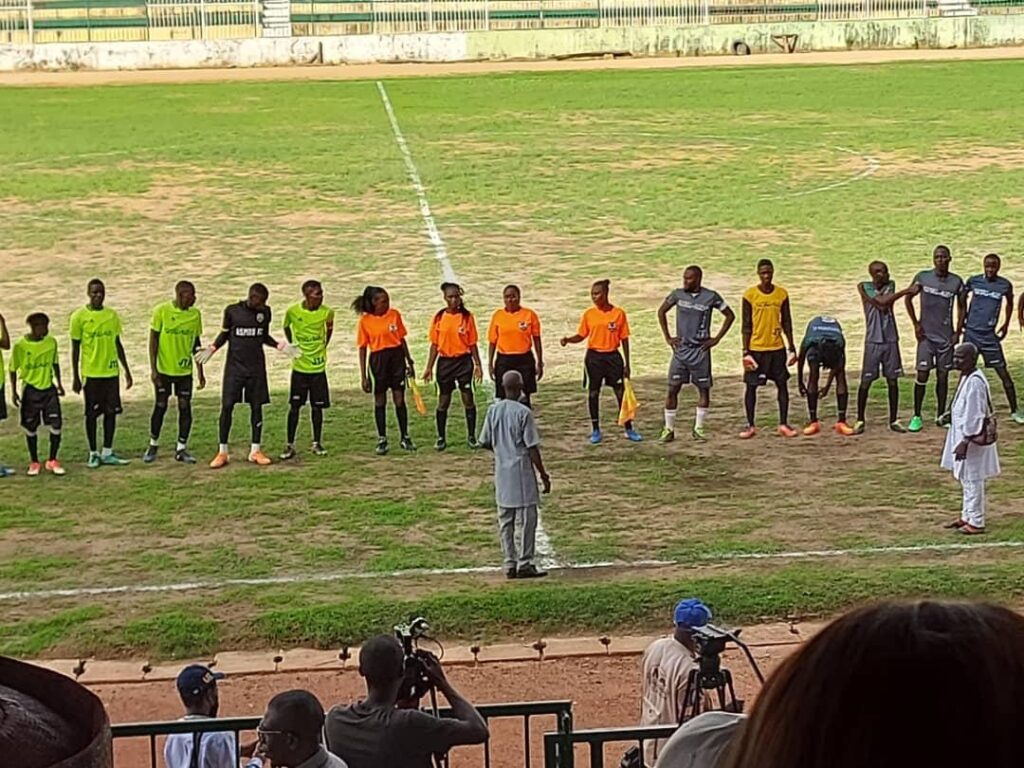
Plateau, a state in North Central Nigeria, has been a hotbed of ethnoreligious crises since 2001 — to varying degrees. The series of violent events have claimed thousands of lives, and the cracks in relations are still tearing communities, who in the past cohabited peacefully, apart. Salis Muhammad Abdulsalam, 58, was deeply concerned about this, so he started a project to change the narrative and bring different sides of the conflict together.
Followers of the two dominant religions –Islam and Christianity have been at loggerheads since 2001, each religion living in different parts of the state, segregated. Hundreds of thousands of innocent lives have been lost as a result.
Statistics from the Armed Conflict Location and Event Data (ACLED) analysed by HumAngle show at least 2,695 people have been killed in various crises across the Jos, Plateau state capital in the last two decades.

Disputes between natives who describe themselves as landowners and presumed settlers who are Hausa-speaking started as far back as September 2001. The crisis started as political and ethnic but was later given a religious colouration that made it worse.
More than 20 years later, the state is still grappling with conflict between various ethnic groups despite interventions from the authorities and non-profit groups. There have been violent outbreaks in the Mangu area of the state, where a clash between farmers and herders turned into a religious conflict between Muslims and Christians. In August 2021, 26 travellers who were returning from a religious function were killed in Jos North and at least 20 others were injured.
Born in 1964, Abdulsalam, whose parents are originally from Adamawa North East Nigeria, but gave birth to him in Jos was tired of receiving news like this, so he started making efforts in 2005 to contribute to the restoration of peace and cordial relations in the state. He observed that many peacebuilding conversations and initiatives often exclude young people even though they constitute the largest population.
He said his motivation for joining the development sector was solely a result of his passion for community service. All he wanted to do was to return the peace that was once enjoyed in the city he was born, grew up in, and had his own children.
As an entertainment entrepreneur, he said that couldn’t be done in the absence of peace. That was what prompted him to start the Displaced Women and Children Foundation (DWCF) in 2006 to provide relief to people the crisis has deprived of homes, with a focus on women and children.
“Through this programme, we are able to reach them,” he said.
Abdulsalam is the founder of Face of Peace, a non-governmental organisation, and the convener of the Music Plus Football initiative.
Music Plus Football is a sports tournament introduced in 2020 with the aim of reuniting neighbours who have become estranged due to the trust deficit in the communities. His organisation identified music and football as some of the most effective tools to pass a message to young people.
They created four teams and named them Love, Patience, Reconciliation, and Unity, believed to all be components of peacebuilding.
Music is played as the football matches go on, with the activities engaging about 200 youths. The participants were drawn from 22 communities regarded as flashpoints of conflict. “The youth leaders gave us the names of 12 football coaches. One Muslim and one Christian from each of these locations,” Abdulsalam explained to HumAngle.
The organisation is not interested in professional footballers, he said, only regular residents willing to drop their differences and play together.
He said the NGO has seven staffers, two interns and dozens of volunteers who are always willing to help when they have a project. It has enjoyed partnerships with the Nigerian Army, University College Ibadan Alumni class of 2000, and Plateau Peace Building Agency among others, and funds from donors like Nexus Foundation.
He said through their partnership with the Nigerian Army in areas of empowerment and skills acquisition in Damboa IDP camp in the southern part of Borno, they have trained hundreds of displaced persons in tailoring, soap making, and other skills.
The finals are held at the Rwang Pam Stadium every year. This year, however, the tournament was postponed because it coincided with the buildup to Nigeria’s general elections, and the organisers feared that politicians could hijack it.
It will now be held in October. The schedule will be released on Thursday, Sept. 21, as the world commemorates the International Day of Peace.
United we stand
One reason the initiative has been able to sustain itself, Abdulsalam said, is partnerships with other groups.
Corporate bodies within Jos gave their products, which were then used as prizes for the winners. Face of Peace also collaborated with local government officials who granted them free access to football pitches in primary schools located in places marked as conflict flashpoints. All the previous editions were held without incident. The Rwang Pam Stadium, used for the final matches, was also secured through a partnership with the Plateau state government.
“We have not enjoyed funding as other programmes do from foreign donors and the rest. So, partnerships worked for us,” said Abdulsalam. “We approached the state government. They gave us a stadium to use for free, something that could cost us ₦500,000 to ₦1 million ($1,270).”
The initiative also enjoyed other forms of support. Government agencies and non-profits assisted with invitation cards, canopies, water, beverages, glucose, and so on.
They are able to encourage the players, aged 18 to 35, with prizes for categories such as best players, best goalkeepers, and winning team. They also enjoy attention from people scouting for talents.
“The jerseys are for free. We don’t take them back. The NGO also covers the cost of their transportation,” the founder added.
He said aside from the goodwill the tournament enjoys, many people have come to him to ask how they can join.

Sustainability
Face of Peace is proud of being able to keep the tournament going. “People identify with success. People are usually scared of new things. So, for us to even sustain it shows the passion which is beyond the material benefit,” Abdulsalam said.
But funding is still hard to come by, he added, explaining that it saddens him to have identified people who are talented in the community and not be in a position to help.
“You feel bad. They are good footballers, but how do they live? Are they traders? Are they artisans? Are they students? The inability to be able to play a role in that part of their life is the biggest challenge we have.”
He believes the players can be better peace advocates when a significant role is played in their livelihoods. When not on the football pitch, what else do they do? And how does this affect their health and input to the sporting activity?
The convener believes many of the spectators come for the music and not the football. The sounds attract them. The venues are meeting points for music and football enthusiasts, who are mostly young people.
In the future, he sees the government taking more interest by probably providing scholarships for the boys, organising skill acquisition programmes, and sponsoring trophies for them. He also hopes to see one of the corporate bodies that have supported the initiative do more by sponsoring the tournament.
He also hopes to increase the number of teams from eight to 10. “But they will have to remain within the same concept,” he said.
Women are part of the initiative to ensure that everyone is carried along. The referees, officials, linesmen, photographers, and refreshment and welfare officers are all women because in communities dominated by Muslims, finding women football players is difficult.

Barriers to scaling
One challenge Abdulsalam has faced is what he calls an inability to export the initiative to other parts of Plateau.
So far, it has worked because of the careful balancing of players from both religions: Islam and Christianity. It may be difficult to achieve this balance in other regions of the state.
“There is a difference between a tournament and a competition. And, this is the highlight of this project,” Abdulsalam explained.
“Jos North can play against Jos South, but when you assemble the eight teams, you will be shocked that 80 per cent of the players in Jos South would be Christians and 90 per cent of the players in Jos North would be Muslims. So when they come to the pitch, that rivalry, that quest for supremacy will play out. The issue of actually building peace will end up being violent.”
To avoid this, an equal number of people are collected from the two major religions while forming the teams. “They come together to play as a team, not against each other.”
He hopes that the Nigerian Army, through its Operation Safe Haven implemented in Plateau and some parts of Kaduna, would borrow a leaf from its programme. They organise peace football competitions, he said, but it doesn’t give the desired result because they are done by pitting one local government area against another, and the rivalry is still there.
Support Our Journalism
There are millions of ordinary people affected by conflict in Africa whose stories are missing in the mainstream media. HumAngle is determined to tell those challenging and under-reported stories, hoping that the people impacted by these conflicts will find the safety and security they deserve.
To ensure that we continue to provide public service coverage, we have a small favour to ask you. We want you to be part of our journalistic endeavour by contributing a token to us.
Your donation will further promote a robust, free, and independent media.
Donate HereStay Closer To The Stories That Matter




